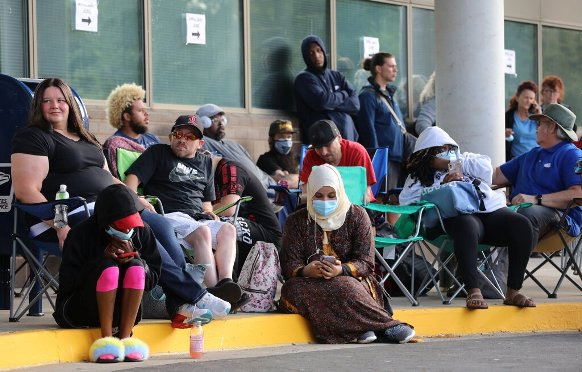Jobless benefits run out as Trump resists signing relief bill
By Emily Cochrane
WASHINGTON — Millions of Americans lost their unemployment coverage Saturday (26) as President Donald Trump resisted signing a sweeping $900 billion aid package until lawmakers more than tripled the size of relief checks, putting the fate of the measure in limbo.
Trump’s resistance to signing the bill risks leaving millions of unemployed Americans without crucial benefits, jeopardizes other critical assistance for businesses and families set to lapse at the end of the year, and raises the possibility of a government shutdown Tuesday (29).
The president blindsided lawmakers last week when he described as “a disgrace” a relief compromise that overwhelmingly passed both chambers and was negotiated by his own Treasury Secretary. He hinted that he might veto the measure unless lawmakers raised the bill’s $600 direct payment checks to $2,000, and Trump, who was largely absent from negotiations over the compromise, doubled down on that criticism Saturday while offering little clarity on his plans. A White House spokesperson declined to indicate what the president intended to do.
“I simply want to get our great people $2000, rather than the measly $600 that is now in the bill,” Trump said on Twitter Saturday, a day he continued to dedicate many of his posts to falsehoods about the election. “Also, stop the billions of dollars in ‘pork.’”
If the president does not sign the $2.3 trillion spending package, which includes the $900 billion in pandemic aid as well as funding to keep the government open past Monday (28), coverage under two federal jobless programs that expanded and extended benefits will have ended on Saturday for millions of unemployed workers.
The consequences of such a delay are dire, economists, policy experts and lawmakers said, particularly as the United States’ economic recovery sputters and the pandemic ravages the country. Some warned that any resolution at this point may be too late for families who will have lost their only lifeline shielding them from the brunt of the pandemic’s economic toll and will further burden overwhelmed state unemployment agencies waiting for guidance on how to enact the legislation.
“Foreclosures, hunger, homelessness, suicide,” said Michele Evermore, a senior policy analyst for the National Employment Law Project, a non-profit workers rights group. “There will be very permanent things that happen to people that can’t be fixed by a check in three weeks.”
Even if the legislation becomes law before the end of the 116th Congress on Jan. 3, the delay will have guaranteed a temporary lapse in unemployment benefits because states will not be allowed to restart benefits until the first week of January. The delay has also effectively reduced the scope of the extension and expansions in the relief bill because they are still scheduled to end in mid-March. A provision in the bill adding $300 a week to unemployment benefits would now last for 10 weeks, instead of the intended 11.
Citing the looming expiration in unemployment benefits, top Democrats, including President-elect Joe Biden, slammed the delay.
“This abdication of responsibility has devastating consequences,” he said in a statement Saturday.
The unsigned 5,593-page bill is waiting at Mar-a-Lago, the Florida estate where Trump is spending the holidays. In addition to providing direct payments and reviving lapsed benefits, the legislation would allocate billions of dollars for the distribution of vaccines and to support struggling small businesses, schools, hospitals, airlines and transit agencies across the country.
After spending time with Trump on Christmas Day, Sen. Lindsey Graham, R-SC, offered support for the president’s push for larger direct payments in the spending legislation and for his veto of a military policy bill this past week because it did not repeal a legal shield for social media companies. Trump has cited the absence of a repeal as one reason for his veto, which lawmakers in both parties have said should not be addressed in such a bill.
“Both are reasonable demands, and I hope Congress is listening,” Graham said Friday (25).
Before Trump’s insistence that the legislation increase relief checks to Americans, Treasury Secretary Steven Mnuchin had promised that direct payments could be sent as early as this week — a timeline that was also now in jeopardy.
After House Republicans blocked a Democratic effort to unilaterally increase the $600 direct payments to $2,000 per adult, top Democrats plan to hold a roll-call vote on the measure Monday when the full House is present. Lawmakers could also potentially approve a stopgap funding bill to keep the government running.
“As the economy continues to falter, folks are hanging on by a thread and desperately need this federal relief to continue so they can afford basics like food, medicine, diapers, phone bills and housing,” said Rep. Richard Neal of Massachusetts, chair of the House Ways and Means Committee. “It is underhanded and cruel for the president now to refuse to sign it into law and potentially end this brutal year by inflicting even more pain and suffering on families in need.”
-New York Time


